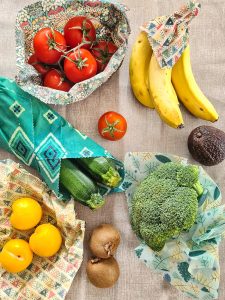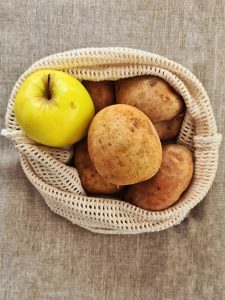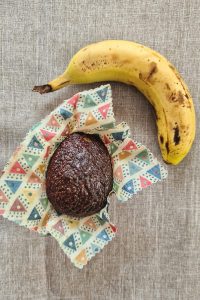🐝 SHIPPING 5€, FREE FROM 40€ - REST OF EUROPE 10€, FREE FROM 80€ 🐝
Not all fruits and vegetables are the same, some produce ethylene gas and others are very sensitive to it. I

Ethylene is a gas emitted by plants, considered an “aging hormone”. This gas is responsible for the ripening of fruits and vegetables, as it causes changes in their color, texture and flavor.
Ethylene does not cause any harm to human health or to plant products, but when a ripe fruit or vegetable releases ethylene it accelerates the ripening of those around it, causing them to decompose much faster than normal. That is why it is important to take into account certain guidelines and know what´s the best way to keep your food fresh until the moment of consumption so that it does not spoil.
In order for food to last longer before consuming it, we must store fruits and vegetables separately according to whether they produce this gas or are sensitive to it.
apple, mango, melon, avocado, plums, kiwi, plums, grapes, tomatoes, and onions.
broccoli, lettuce, asparagus, potatoes, pumpkin, red fruits and carrots.
In addition to producing ethylene in large quantities, bananas are also very sensitive to it, so it is important that if we have a large amount of them, we store them separately or by covering the end where the cluster is formed with a beeswax wrap to avoid using plastic film.
The most important thing is to allow the food to breathe and not to store it in hermetic bags or containers in which the gas is trapped since its effect will be greater. If you usually shop at a supermarket and the fruits or veggies you get come in bags, once washed, store them in containers that allow them to breathe or use beeswax wraps. Here I explain why they are an excellent option for allowing food to breathe.

– Always separate overripe fruits and veggies from the rest so that ethylene does not accelerate their ripening. For example plums and peaches emit very little ethylene when they are still green, but their production shoots up when they start ripening.
– The potatoes should never go together with onions, instead put an apple next to them and you will delay the appearance of sprouts.
– Store the half of the avocado that you are not going to use in a small beeswax wrap, make sure you leave the pit. You can sprinkle a few drops of lemon juice to prevent oxidation and then wrap it.
– Cover broccoli, carrots and berries with your wraps to preserve them for longer. You can cut the carrots into sticks before wrapping them so they are ready to eat as a snack!
– Sometimes we do want some fruit to ripen faster. If you have avocados that need a few days of ripening, put them next to bananas or wrap them with paper or newspaper and leave them in a warm area in your home, for example on top of the refrigerator.
– If you have bananas that are already very soft and ripe, prepare a delicious smoothie or use it in a pastry recipe such as a Banana Bread. Overripe fruits are ideal for making homemade jams.
I hope this information has been helpful. It is very easy to extend the life of your food once you know its properties. Do you know any other tricks to keep them fresh? Leave them in the comments section!
"A great discovery! The truth is that they have surprised me a lot, so much so that I am already going for my second order! 😀 Their designs are very original and varied, I also love the packing, you can see that they put a lot of love to the product. I also recommend it as a gift for your mothers, mine does not stop using them 😉 "
"Fabulous pack with different sizes of wraps, ideal for storing food of different dimensions. They are super useful for every day use. The applications it has are endless, and you also know that you are saving on plastics every time you use them, I love that they are reusable! "
"Wonderful. I bought a pack of three sizes and then an XL to give them as a gift, and they keep giving me good references. And I feel good knowing that I have done my bit to take care of the planet."
"The best package to try! You have the 3 essential sizes to try the product… .but you'll like it so much that you'll later buy the sizes you use the most !!!"
We took a break.
FOR ANY QUESTIONS SEND US A MESSAGE.
By continuing to use the site, you agree to the use of cookies. More information
The cookie settings on this website are set to "allow cookies" to give you the best browsing experience possible. If you continue to use this website without changing your cookie settings or you click "Accept" below then you are consenting to this.